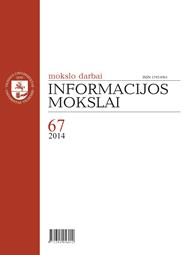Informacijos ir komunikacijos specialistų strateginės lyderystės kompetencijų formavimo kryptys:empirinio tyrimo kokybinė interpretacija
TRENDS OF BUILDING STRATEGIC LEADERSHIP COMPETENCIES OF INFORMATION AND COMMUNICATION PROFESSIONALS: QUALITATIVE INTERPRETATION OF THE EMPIRICAL ...
Author(s): Saulė JokūbauskienėSubject(s): Economy
Published by: Vilniaus Universiteto Leidykla
Summary/Abstract: The development of the knowledge society started as far back as several decades ago; nevertheless, it is assumed that there is often no alignment between the requirements of the knowledge society (competitiveness, productivity and professionalism) and core competencies of its actors (Porter, 1990). The existing advanced and flexible tools for developing competencies, which would enable citizens to acquire and employ the needed essential competencies and facilitate their participation in the labour market, have not been exhausted either. The quantity and quality of information with all its meanings becomes more important in the competitiveness of knowledge based society, which is one of the main priorities of Lithuania. The important methodological provisions are relevant to the building strategic leadership competencies of information and communication professionals in learning organizations. The strategic decisions of the area allow governing the growing flows of information resources. General problems of knowledge society, its development trends and possible scenarios of decision making are analysed in the article. The empirical research in the subject area, the results of the empirical research as well as qualitative interpretation of empirical research have been presented in the article as well.
Journal: Informacijos mokslai
- Issue Year: 2014
- Issue No: 67
- Page Range: 43-62
- Page Count: 20
- Language: Lithuanian

